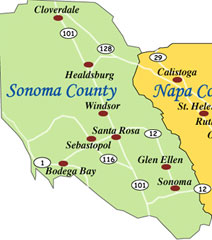California’s
Sonoma County has long been known for wineries that lead on sustainability, and now they are joining to create the first 100% sustainable wine region in the world.
Shooting for 100% is a big goal but Sonoma County Winegrowers – which represents 1800 businesses – say they’ll get there in five years – by 2019.
“Our county’s grape growers and winemakers have long been at the forefront of creating and utilizing sustainable practices in the vineyard, in the winery and in running their businesses, so this is the next natural step in their continued evolution,” says Karissa Kruse, president of Sonoma County Winegrowers. “
They hope to accomplish it through these phases:
1. Convey best practice management by directly helping vineyards access where they are now on land use, canopy management, energy efficiency, water quality, carbon emissions, healthcare and employee training. They plan to assess 15,000 acres a year until they cover every last 59, 218 acres – 6% of the county’s acreage.
2. Work directly with vineyard owners to achieve certification from a third-party, such
as the California Sustainable Winegrowing Alliance Code of Sustainability.
Wineries will receive regular progress updates, an annual Report Card and will be able to track their progress in real-time at the Winegrowers website.

"I commend the growers
and wineries of Sonoma County for pursuing this bold initiative. It speaks
volumes about their love of the land and their commitment to environmental
stewardship, their community and their consumers,” says Karen Ross, Secretary
of California’s Department of Food and Agriculture.”
Comprised mostly of multi-generational family businesses, most of the county’s wineries are on under 100 acres. Within Sonoma county there are 17 distinct climate zones which give the various wines their distinctive tastes.
All this, of course, is threatened by climate change as is evidenced now by the state’s searing drought. Going forward, the highest sustainability standards will really be necessary to protect their fragile crops.

